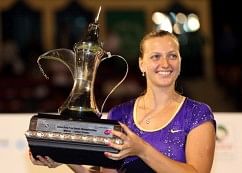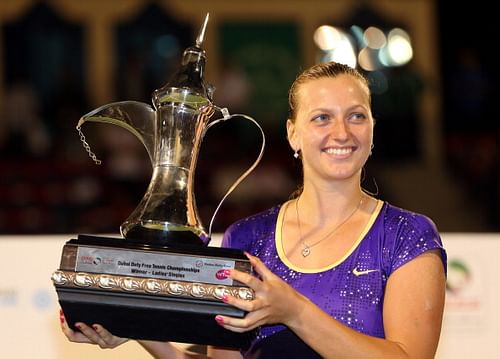
Petra Kvitova and the search for perfection

Of all the unattainable things that the human mind likes to fantasize about, perfection is both the most celebrated and the most bedeviled. Perfection – in any form or shape – is what the heart covets most of all, yet it is also the one thing that, we’ve been assured countless times, will always remain out of our reach. Beethoven’s 9th symphony and Michelangelo’s work on the Sistine Chapel have inspired legions of admirers and reams of gushing praise; despite their apparent flawlessness, however, critics have found flaws in them to maintain the tantalizing yet definitive gap between human effort and that mythical idea of perfection. No matter how immaculate a performance may look on the surface, there’s always going to be a way to undermine it – that’s become ingrained in our minds by now. And yet, I regularly lose sight of that dictum when I watch Petra Kvitova in full flow on a tennis court.
When Kvitova won the 2011 Wimbledon championship by putting up a scarcely-believable display of pure offensive tennis in the final against Maria Sharapova, I had predicted, perhaps foolishly, that Kvitova was destined to rule women’s tennis for the foreseeable future. That certainly hasn’t come to pass; in the two-year period that has elapsed since then, the Czech has failed to add another Slam title to her tally, and hasn’t even reached the No. 1 ranking. But every now and then, she puts up performances like the ones she did in the first and third sets against Sara Errani in the Dubai final yesterday, and you end up grasping at straws to find reasons for her career struggles. Yesterday, I once again found myself asking the question that has plagued me ever since that defining Wimbledon victory: why exactly is this woman not lording over the rest of the women’s field (excluding Serena Williams)?
Yes, for those two sets, and for almost the entire tournament before the final, Kvitova’s tennis was actually that good. It was even, in some games and several rallies, perfect. As she takes the ball impossibly early and makes those almighty swings with her racquet, you know, and her opponent probably knows with even more painful obviousness, that there’s nothing that can be done. You can learn all the tricks in the world, and practise tirelessly to find ways to redirect your opponent’s power, but nothing can prepare you for Kvitova’s raw, unbridled shot-making. Errani, who is one of the quickest and most dogged counterpunchers on the tour today, was left flat-footed by a screaming, meters-away winner so often yesterday that after a while it started looking like a battle between a 20-time Slam winner and a junior player. There were some points that lasted longer than 5 shots, and in some of those you briefly got the feeling that the Italian had managed to get a foothold in a rally; but then – wham! – out of nowhere, Kvitova would nonchalantly change the direction of the ball and end the point with a spectacular, line-cleaning winner. Yesterday, and for most of her career, she made hitting winners look like the easiest thing in the world.
As brilliant as Kvitova was in the first and third sets, though, Errani made all the running in the middle second set. Wisely realizing the futility of exchanging blows with her opponent from the baseline, Errani started attacking the net like a woman possessed. She approached the net behind her serve, behind every remotely well-struck groundstroke, and even behind some of her returns. The sudden change in proceedings seemed to surprise Kvitova, and rusty as they were, her first few passing shots couldn’t make nearly enough of an impression on the deft touch and soft hands of Errani. That small shift in momentum, however, did more than just win a few points for Errani. It also acted as the catalyst for Kvitova’s whole game to come unstuck – for the awesome winners to be replaced by awful errors, and for her barks of celebration to be replaced by screams of frustration. Her serve followed her groundstrokes down south, and suddenly, for no apparent reason, it was Kvitova who was looking like the junior player and Errani the accomplished champion. The set whizzed by with a 6-1 scoreline in favor of Errani, and when the Czech went three break points down at 1-1 in the third set, her self-destruction seemed on the verge of being set in dispiriting stone.
Fortunately for Kvitova, her game switched on just as suddenly as it had switched off. Faced with the first real threat of actually losing the match, she rediscovered her big serve and laser groundstrokes, and once she did that, there was no real doubt how the match would end. Errani’s net rushes were now met with assured passing winners, and before you knew it, Kvitova had wrapped up the set 6-1, and with it the match. She finished the contest exactly the way she had started it – with a barrage of monstrous, inch-perfect winners – and she had the Dubai title to show for it. Looking at the closing stages of the tournament, you wouldn’t have guessed how close Kvitova had come to throwing it all away, and considering that she actually did win the trophy, it is perhaps pointless to pontificate on those lapses of concentration. In the big picture, though, those lapses of concentration matter. They matter so much, in fact, that they can separate the legendary champions from the random, inconsistent-yet-spectacular shot-makers.
Is that what it is, then? Is Kvitova being held back solely by her inability to keep her focus during her matches? I wish it were that simple. And I’m guessing Kvitova wishes that too. The woman has been frequently plagued by injuries over the past year; her asthma makes playing in hot and humid conditions incredibly difficult, and is one of the reasons for her sub-par performances in North American tournaments. Then there’s the pressure of handling the fact that she should win most of her matches because of her physical superiority over nearly every woman on tour (a problem that also regularly cripples Samantha Stosur). There’s also, sometimes, the pressure of dealing with the possibility of greater glory being within her grasp, which she has not dealt with particularly well so far. Last year at the Australian Open, she seemed to let the possibility of reaching the No. 1 ranking mess with her head, which resulted in a strange semifinal loss to Sharapova. More recently, in the Doha quarterfinal, after controlling the proceedings for most of the match, she froze when within striking distance of claiming her first victory over Serena Williams.
During the time I’ve followed Kvitova’s career, I’ve been frequently reminded of the saying “there’s a fine line between genius and stupidity”. Her winners are absolutely thrilling to the naked eye; when they land flush on the line, you can’t help but give a gasp of disbelief and then thunderously applaud her for her daredevilry. And when she hits an almost identical shot to an earlier winner, but which this time lands a couple of inches outside the line, you are tempted to dismiss her as a mindless ball-basher who has no patience. Her mid-match facial expressions are similarly dazzling-or-dismal. When things are working well for her, her eyes widen in fierce determination, and every step that she makes on the court, including the seemingly-inadvisable-but-ultimately-fruitful forays to the net, look like the product of a fabulously intelligent tennis mind. And when things go pear-shaped, her eyes widen again, but this time it’s more of a deer-in-the-headlights look than a woman-on-a-mission one. For Kvitova, there is a fine line between genius and stupidity indeed. Or at least that’s what it looks like.
Almost every player faces the kinds of problems that Kvitova does, but not every player is blessed with the kind of raw talent that the Czech is born with. In fact, no player has the kind of effortless power that Kvitova does; not even Serena. So we’ll keep waiting, then, for the day when Kvitova finally irons out her physical and mental flaws and becomes the tennis player that she seems destined to be. And you don’t have to think too hard to know why we await that day. The promise, after all, is seeing a tennis player regularly take the game of tennis to new heights with her unadulterated, show-stopping play. The promise is seeing perfection, day-in and day-out.